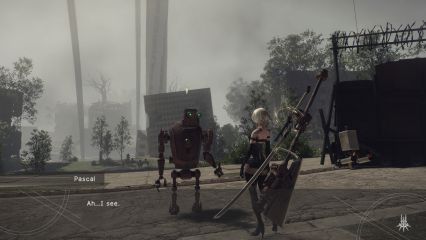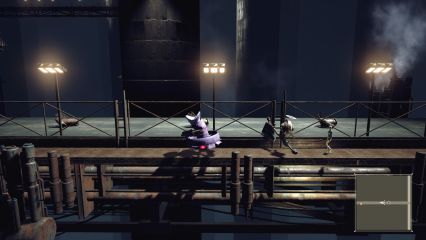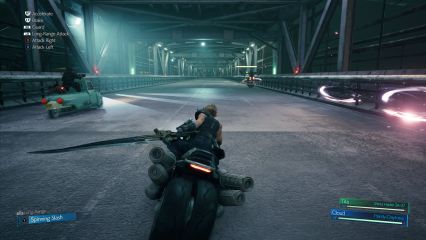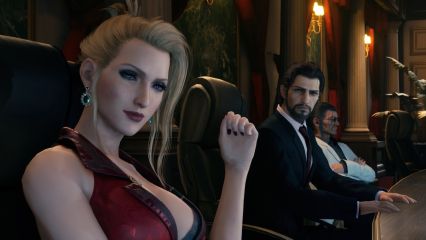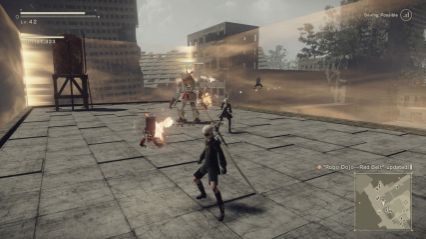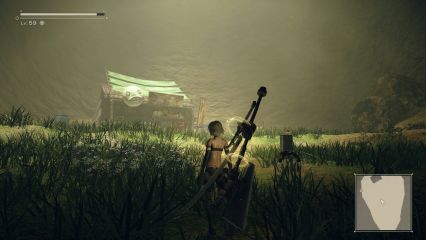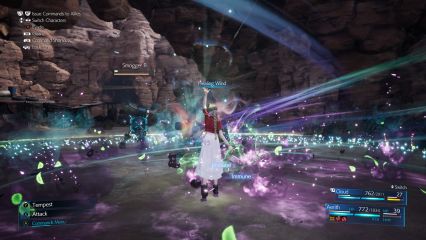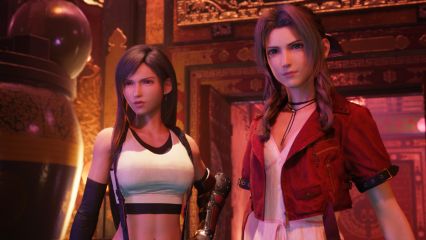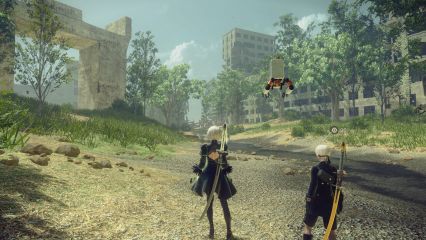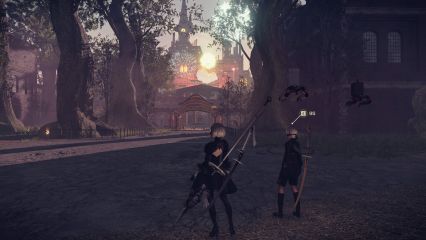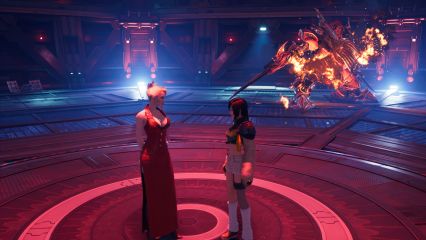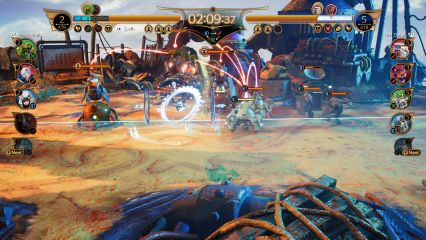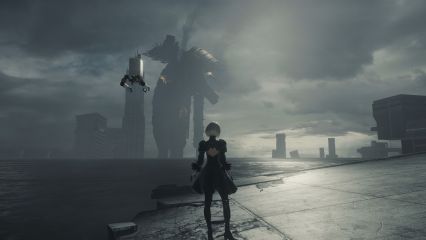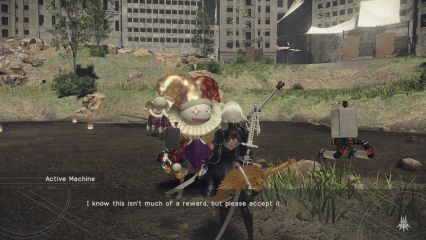25th of February 2023
Final Fantasy VII Remake & Nier Automata
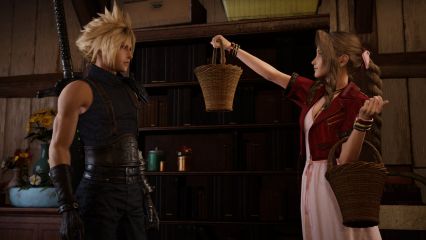
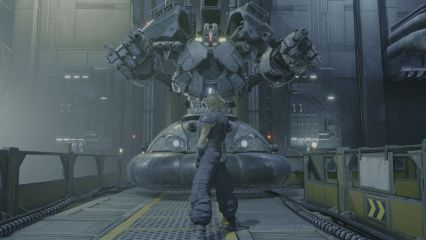
Following with the format of my Doom Eternal & Far Cry IV review, this is a match-up between Final Fantasy VII Remake
and Nier Automata, both Japanese RPGs with big swords, published by Square Enix.
I first played Final Fantasy VII in 1998 when it was released on the PC. After finishing it I immediately
considered it the best game I've ever played. Since then I've replayed the game four times and never had to reconsider
my initial assessment. So, expectations for this remake were pretty high but also realistic, for nostalgia
is a powerful force to overcome.
Nier is a more recent curiosity. I really enjoyed Lightning Returns some years ago; superficially Nier seemed
similar, and it's considered by many one of the best games of all time - but it also has a reputation for being
somewhat polarising.
Final Fantasy VII Remake comprises only the Midgar segment, which in the original took somewhere between 5-10 hours.
So how did they turn that into a 50-hour game? Well, Midgar's scale is realistic this time around, so you can no longer
sprint past, say, the Sector 5 slums (which in the original consisted of a few pre-rendered images) in just a few seconds
at a fixed angle. There's actually very little content that genuinely felt like length-padding - but some are bound to
consider any deviations from the original as such. That'd be silly, as Midgar always had plenty of potential to fill
an entire game.
The story is still pretty much exactly the same,
although there are a few new segments, including various sidequests and a longer story bit about Jessie. This pertains
to dialog as well, for better or worse. Final Fantasy games have always been kinda silly and childish while dealing
with a lot of serious stuff. It was easier to tolerate with cartoony characters and inferior technology, but it definitely doesn't translate that well into
a fully three-dimensional environment with more realistic characters. The four girls' (Tifa, Aeris, Jessie and Yuffie) "cheeriness" occasionally gets
a bit grating. Again, they're just like in the original, but it was easier to tolerate when they were "voiced" by a
monotonic voice inside your head. (Not that there's anything wrong with the quality of their voice acting; surely the actors
had to take the personalities as given, leaving little room for creativity.) But it's Cloud who's by far the most annoying character, being borderline autistic. For
most of the game he's surrounded by hot women who're obviously into him and yet he seems to have no idea what's going
on. Surely it'll get better, as Cloud's issues weren't fully resolved until late in the original game - and way beyond
the walls of Midgar.
Anyway, for this more realistic and less cartoony remake they could have toned down the "anime" personalities of the original a little bit.
But it's a tough spot for the developers to be in;
make the dialog and characters less like the originals and many fans will be mad as hell.
The writing suffers from other annoyances as well. There were way too many scenes where someone is hanging from a ledge
and is saved (or not) at the last second. The characters also have a bad habit of taking their sweet
time talking when they're meant to be in a hurry, a trait inherited from Hollywood I'm sure.
When it comes to story and dialog, Nier Automata shows how it's done. This game has a fantastic world design and endlessly fascinating lore. Automata takes place in the distant future of a world than spun off the fifth alternative ending of an obscure 2003 PS2 game called Drakengard. It's been ten thousand years since mankind inhabited the Earth; the only things left are warring robots and androids. To be sure, a lot of Nier's specifics are sheer NONSENSE (just try reading the fan wiki), but this is style AND substance over details. There's a freaking Disneyland type of theme park inhabited by robots trying to act like they'd expect humans to act, a robot kingdom "ruled" by a baby machine and a village of peaceful robots mostly interested in philosophy and looking after their "children". For those wanting to know more, there's a LOT of background information, but it's only for those who go out of their way to find it: After all, what happened THOUSANDS of years ago isn't terribly relevant to what's going on in the game (and the protagonists are kept in the dark by higher powers), but it sure as hell makes for a fascinating read. Nier also employs some "quirky" things like using plain text and music to convey stories - and it works. There are some truly heart-breaking moments too, which says a lot about a game about robots.
But while Nier handily beats Final Fantasy VII Remake in the maturity of its story and characters, it fails miserably in the gameplay department, particularly combat. Nier's combat system is very underwhelming, a typical "hack 'n' slash" with little depth. Often you can simply circle the enemy while firing with your pod and take swipes with your melee weapon every now and then. The enemy basically always warns when it's about to attack, and dodging is spammable. You can configure your "chips" to automate certain things like healing and damage boosting, but this never really felt necessary on normal difficulty, which to me seemed like poor balancing. Only when trying the game on hard did I feel like I had to pay more attention to my chips. Meanwhile, in VIIR properly setting up your materias makes a much bigger difference: I can't imagine playing VIIR and ignoring the materia system while with Nier I kept forgetting the chip system even existed. Furthermore, higher level enemies in Nier are mostly just bullet sponges rather than truly more challenging - and the hacking ability that you obtain later can take care of even them rather easily.
The battle system in VII Remake feels in many ways like the culmination of a long process of steady improvements that started with XII.
The turn-based combat system still worked well in the original Final Fantasy VII, then failed miserably in VIII (draw, draw and draw some more), got lethargic in IX and had its swan song with X. Especially
the PSX era games were often about simply spamming the most powerful spell on the list and healing every now and then. Moreover, with some grinding
you could fool yourself into believing you were getting better as a player. With more
recent FF games you actually need a bit of skill as well.
Some elements of the original VII are still there. You build ATB with time (ATB is a chunk of "time" used to "do stuff"), but it's used for both spells (that still cost MP as well) and ATB abilities (character-specific special
attacks like Braver). Regular attacks, dodges and guarding don't use ATB but can yield it, which means you can actually earn
ATB by playing well - and you can further improve these gains with specific materia if you want to build your combat style around ATB management.
Even Limit Breaks and Summons are in the game. Limit Breaks are maybe even more decisive than they used to be, but you've gotta be more
careful with them, as they can miss. Summons are more balanced this time around; they don't provide an immediate
benefit but a benefit over time as your "guardian" joins the battle for a few minutes.
The game borrows the stagger mechanic from XIII (i.e., once you deal enough damage the enemy gets staggered and takes considerably more damage for a short period of time), but now you have to pay more attention to
enemy weaknesses and such to increase the stagger gauge. Naturally, you can move around the battle arena, and you need to utilize
both dodging and guarding to survive. (Although you can set the game to "Classic" mode which lets the AI perform all the basic attacks and guarding while
you remain in control of the ATB, which simply makes the game easier and a lot more boring). Unlike in XIII, you can switch between characters during
battle. On their own the AI characters do simple things like
regular attacks and dodges/guards, but rarely use ATB; this is good, as it's the player who should get to make the important
decisions over the allocation of ATB. Conveniently, you can issue commands to other characters without having to switch to them, and you can assign
your favorite ATB abilities (some are better for building stagger, others for damage output) to shortcuts. The materia system is there too, functioning
pretty much like it did in the original, but naturally they've added a whole bunch of new materias as well that take the intricacies of the new combat
system into account. Just too bad scrolling long lists of materias is just as tedious as it was in the original...
The game is well balanced in that most boss fights feel intense and close, but I actually never got a game over in any of them on normal difficulty.
(I did die twice in a regular battle though and once in a VR simulator - again, on normal playthrough.)
But there are some annoyances. Targeting with a controller is wonky and even after a hundred hours I couldn't get a hang of it - but luckily it's
not something you need often. Your attacks can miss rather easily while enemy attacks may interrupt your attacks. Granted, this is a skill issue;
you need to pay attention to what the enemy is doing, but it was still rather annoying.
Nier's gameplay doesn't fare that much better outside combat either. The game opens with an hour-long prologue during which there's no saving.
To be sure, I didn't mind this even though I had to repeat the segment once; I'm glad some developers have the balls to put stuff like
that in their game when they know it's going to piss people off. But in that segment it's just a matter of becoming a better player.
After this the game becomes semi-open world with a center area (City Ruins) and five or six larger zones that connect to it.
Nier's controls are fine, but I found it annoying trying to position the character correctly to grab a ladder or open a chest. The game
also loves to screw you with camera angles; sometimes it forces a side view (like a platformer), other times a top view. Quirkiness I
guess, but it was mostly just annoying and definitely intentionally so when during some boss fights the camera becomes your
main challenge. In one particularly obnoxious scene you're meant to slip underneath some hydraulic presses and just as you're about to do that,
the screen gets filled with smoke just to screw with your timing. The game has shoot-em-up type hacking and flight segments for variety; these were okay as far as ideas are concerned but not without their
annoyances: Hacking suffers from a technical problem in that it's affected by your framerate, so playing on your tv becomes a handicap as opposed to a 144hz monitor,
and the flight segments have angles you can't reach for no apparent reason.
The game's gimmick is that it has three main "routes" you need to play through in order to properly finish the game. First is a playthrough as 2B, then the same story with slight
variations as 9S, then a finale alternating between A2 and 9S (these are all so-called YoRHa android units). Each route ends with a credit roll. Obviously the 9S route is the lowpoint of the game, but at least
you can get through it relatively quickly (depending on how many sidequests you do, many of which are shared between the first two routes). Oh,
and in addition to route C ending, there are also endings D and E which are basically a must (and require only repeating the last battle via chapter select).
And of course there are 24 other endings in the game, but basically all but the three main ones are gimmicks. Like, during a mission where urgency
is required, if you stray off the path to go fishing or something, the game will end with a credit roll. I actually like
this idea, as with way too many games, including the FFVII Remake, you're meant to be in a hurry and yet you're free to take your
sweet time doing whatever; why shouldn't that be punished? (Which is probably also why I liked Lightning Returns, a game
built around a clock ticking down.) Anyway, I finished more than 80% of sidequests (most on route A) and the routes took me 24 hours (A), 10 hours (B) and 13 hours (C, D & E).
Final Fantasy VII Remake is more streamlined in comparison, consisting of linear dungeons (as they were in the original) and three hub areas (Sector 5 & 7 slums and the Wall Market) with various sidequests. It has a certain relaxed sense of progression and good pacing to it, with linear dungeons culminating in tough but fun boss battles. Then you get to enjoy more open-ended exploration and some sidequests in the hubs. Sidequests in VIIR are relatively inoffensive (except for some challenge type quests that can be extremely hard - FUCK YOU JULES!); they're short, don't involve too much legwork and yield good rewards for the low effort required to finish them. The one quest that's a bit longer ends with a boss fight against Behemoth, so it's well worth it. Moreover, the sidequests are restricted to specific chapters with hub sections, so they cannot really distract you in the course of regular gameplay. On the other hand, none of them really felt significant story-wise, and the NPCs they introduce are uninteresting and talk too much. It's the opposite in Nier, where sidequests are often worth it lore-wise, but gameplay-wise they're goddamn tedious, involving a lot of legwork, backtracking and repetitive battles for the sake of fetching items. I lost count of how many times I went through the same linear hallways of the Abandoned Factory, fighting the same robots over and over again. And it's not just the sidequests; in general you'll be revisiting the same places over and over again until you grow sick and tired of them. Sure, eventually you'll unlock some fast travel stations, but this just makes all the back and forth a bit more bearable. Nier also has the worst map in videogame history (and apparently the developers INTENDED it to suck; there's even a reference to how bad it is in the game).
That being said, while the Remake is a lot of fun, its gameplay does suffer from a few issues. First you'll notice there's no free jumping. Obviously the game has been built around this limitation, so it doesn't really make you worse off, but it just feels wrong in 2023, especially after Lightning Returns was nice enough to introduce this feature to the series almost a decade ago. The game also borrows a very infuriating feature from modern gaming whereby at certain moments your character is prevented from running and instead is forced to walk slowly. Sometimes it's obviously so that you can't "outrun" NPCs talking about something you're expected to listen, but it's used way too often and it's basically always totally unnecessary. Pacing has some serious issues as well. Chapters 8 & 9 are both "hub" chapters (the Sector 5 Slums & Wall Market), which means too much interacting with NPCs crammed into consecutive chapters. Chapter 13 is meant to be a high-octane chapter (this is the one where Shinra is trying to drop the plate on the slums), but it gets annoying when you're constantly interrupted by cutscenes (particularly when Aeris is trying to reach Marlene). Chapter 17 has a tedious and repetitive opening segment with copypasted gameplay that just goes on and on. Also, while the Midgar segment in the original ended with a sense relief and excitement of an adventure ahead, here it's crammed full of stupid new lore and epic fights. Maybe it was done to underline the fact that this is a full game (it is, just not the full story), but they sure as hell could have do it without the "destiny ghosts" and floating space platforms; it's just unimaginative, cliche and childish.
As for visual fidelity, Nier is obviously going to lose this one considering it's quite a few years older than FFVIIR.
Not that its graphics suck or anything; the game looks bleak, but obviously that is intentionally so, and there's a certain fascinating
quality to watching buildings once inhabited by men in the process of being devoured by nature. But the game's 4K performance
could be a lot better. Meanwhile, VIIR looks and runs great in 4K even at full settings. I spent a hundred hours on the game and
got exactly zero crashes. You get an extra kick out of seeing familiar objects and locations from the original in true 3D, and character
models, especially those of the female cast, look gorgeous. (NPCs are noticeably lower quality in comparison, but that's understandable.)
Both games have good soundtracks as well. Now, I don't fully get the praise the Remake's soundtrack has been getting, but
that's probably because nostalgia is such a powerful force especially with music that you instinctively dislike any variations just because.
There are some good brand new tunes ("Collapsed Expressway"), some good re-renditions of classics ("Under the Rotting Pizza", "Shinra Creed", "Seven
Seconds till the End") and a fantastic extended intro track ("Midgar, City of Mako"; the moment the camera starts zooming away from
Aeris's face and toward the Shinra building is chill-inducing). While VIIR's soundtrack is a bit all over the place, Nier's soundtrack is the
perfect accompaniment to the game's bleak and melancholic world. It's not exactly something I'd play in the background on a regular day,
but it is a more "organic" part of the game's ambience than that of VIIR.
Both games have excellent chapter selection menus that unlock after you've finished the games. This makes it very convenient to tackle any remaining sidequests and achievements. Finishing VIIR also unlocks a hard mode. I dove into it right away, which I almost never do (the last time was Alien Isolation, in fact). If I died zero times to a boss on normal mode, I died many times on hard mode. Everything hits you harder, but more importantly the hard mode takes away your ability to use items and severely restricts your ability to replenish MP in the field; you can't use Ethers, and benches (which are functionally similar to sleeping/tents in other FF games) only restore your health, so the only way to get more MP is via small drops from crates, slow MP regeneration during combat, some MP-yielding/absorbing spells and ATB abilities and by finishing a chapter. The game gets a whole new layer when you need to keep your eye on MP, especially during long chapters with multiple bosses. Moreover, the hard mode unlocks a bunch of special boss and superboss battles; these are quite tough but well worth the trouble. All in all I ended up spending around 100 hours on Final Fantasy VII Remake, and that includes two playthroughs of both the base game and the DLC and every achievement obtained. With Nier I had no desire to touch the game after my "full" playthrough that took around 50 hours. The game has a hard mode as well, but it merely makes the enemies hit harder and removes your pod's lock-on feature.
Both games come bundled with some DLC. In Nier these are just battle arenas that I couldn't care less about. In the Remake you'll get the INTERmission DLC, which is a side story featuring Yuffie, sent to Midgar by Wutai to spy on Shinra. This is one of the best pieces of DLC for any game; it introduces enough variations to Remake's combat system, adds two new superbosses (the second of which, Weiss, is really tough), a fun Fort Condor minigame and a pretty good story with some new locations (plus one recycled).
Conclusion: This contest of games is won by Final Fantasy VII Remake due to its fun factor and near-perfect combat system. While story and
characters are important, a game needs to be most of all fun to play. A lot of the time I was simply irritated while playing
Nier while I struggled to put down the controller and call it a day when playing the Remake. It speaks volumes that I was
excited to start a combat-oriented hard-mode playthrough immediately after having finished my first playthrough. They also did such a fantastic job turning
the Midgar segment into a full-fledged game. But the game does suffer from some pacing issues, occasionally bad writing, and the ending
left me feeling ambivalent. The characters' personalities also could have used some upgrading, as the 2D anime personalities of the original are a poor fit
for the Remake's more realistic world.
Still, in many ways Nier Automata will be the more memorable game. It has a strong story, rich lore with a lot of depth and a well balanced cast of
characters. Some might call all the existential themes pretentious, but this is the same crowd that'd probably call any attempt to involve philosophy
pretentious. Unfortunately someone forgot that Nier is still a game though, and so you have to put up with a lot of tedium, backtracking, frustration, questionable
camera angles and rather boring combat to get to the good parts. Hardcore fans believe the game's auteur, Yoko Taro, may have intended all this, that the
bad design choices are meant to tell us something and that we should just recognize his genius - but that'd be pretentious; bad gameplay is bad gameplay whether
it's intentional or not. Even so, the way the soundtrack mingles with the game's weird post-apocalyptic world alone makes Nier Automata well worth experiencing.
Final Fantasy VII Remake Integrade:



Nier Automata:





